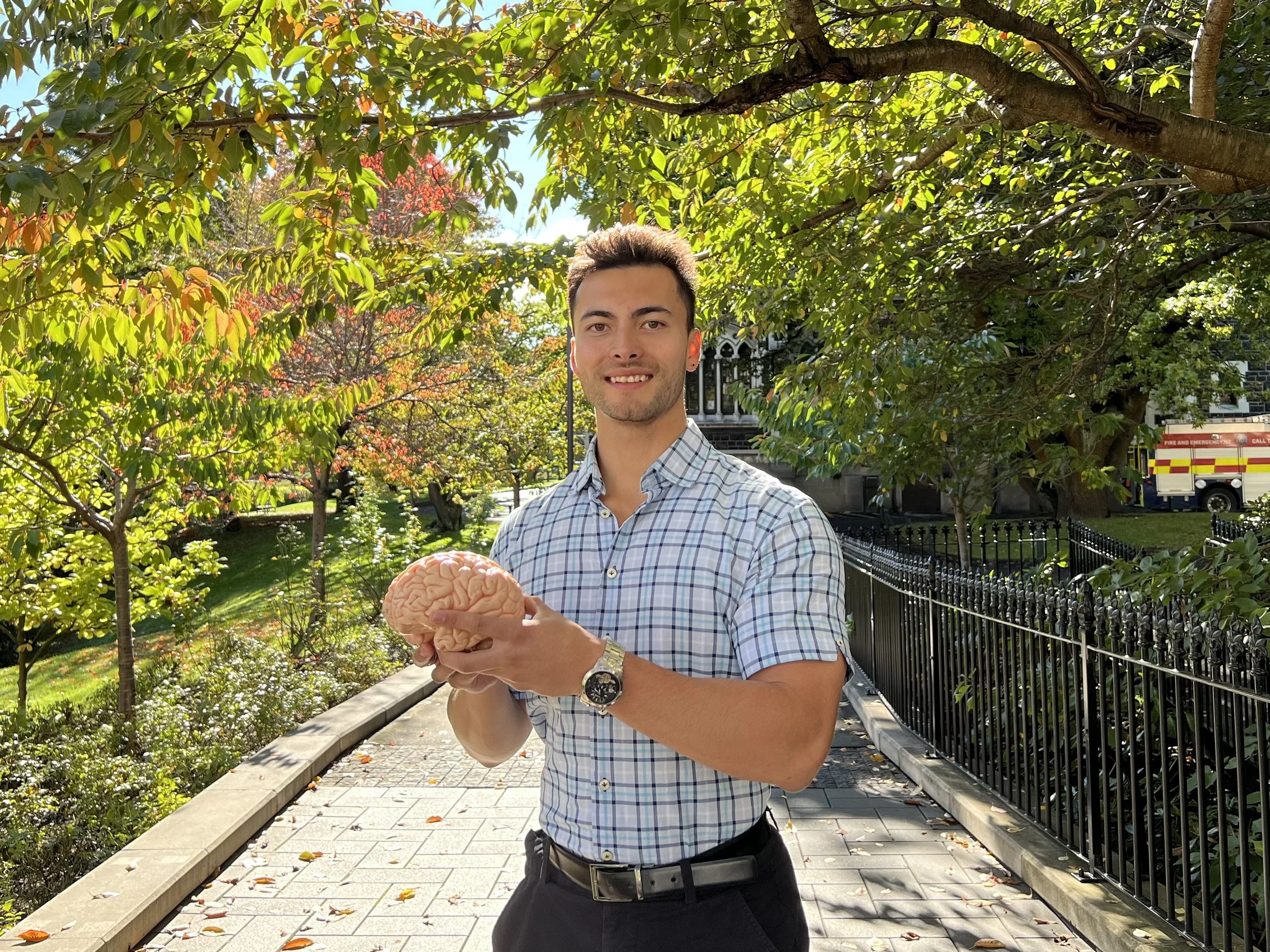FLAG Researcher Spotlight: Joseph Balfe
Joseph Balfe
Clarendon Scholar PhD Student at Oxford University
Hi Joseph, could you tell me about your research to date? Including your undergrad and your master’s project.
Well, I came to Otago to do my Bachelor of Music and was gunning to become a full-time professional musician. I met a tremendous diversity of talented people who wanted to change the world, and my perspectives were profoundly challenged. I was inspired to try something completely new. Whilst at university, I worked within the residential colleges providing academic support and pastoral care. This job enlightened me to the seriousness of mental health, which was something I had never really been exposed to before. This prompted my curiosity about the human mind in the context of pain, suffering, and well-being. For this reason, I found myself pursuing a degree in neuroscience.
Following this, I completed a Master of Science in Neuroscience at the University of Otago with Associate Professor Yusuf Cakmak. I knew I wanted to do a PhD one day, but I first wanted to take some time to think carefully about my research focus. During my Master’s, I investigated the potential of using neuromodulation to alleviate bronchoconstriction, where I found that we can non-invasively open the airways in real-time during exercise-induced bronchoconstriction in humans. With such promising findings, we have charged on to develop a medical device called the VentiMate to help people who struggle with bronchoconstriction, such as asthma.
Yes, VentiMate sounds really interesting. Can you tell me about going from preliminary data to developing a device? What is the current progress of Ventimate?
We found these exciting results quickly, and while I was still doing my master’s, Yusuf and I decided to make this clinically meaningful for people. We approached Otago Innovation, and together we scoped out the commercial potential of VentiMate and worked together to file a patent. We recently received funding from Te Titoki Mataora to proceed with a clinical trial in collaboration with the University of Auckland, which is exciting. Overall, while we are in early stages, everything is progressing nicely, which is excellent.
And you have recently been to Berlin, haven’t you? Can you tell us what this was for and the process of getting there?
I took part in Falling Walls Lab Aotearoa New Zealand. The Falling Walls Foundation is a non-profit organisation based in Berlin that aims to break down barriers in science and society. They are all about finding solutions to our current big societal problems and are not exclusively healthcare-related. The New Zealand final was held in Wellington at the Royal Society, with 19 of us from NZ and across the Pacific. It was an absolutely fantastic experience being surrounded by such inspiring and engaging people. For the competition, we gave a three-minute pitch about our target problem and proposed solution. For me, the problem was asthma, and my solution was VentiMate.
Fortunately, I was the overall winner for the New Zealand competition, which meant I could compete in Berlin at the global finale in November 2024. This event was incredible. I was with 100 other finalists from 100 different countries, and I met so many inspiring people. Politicians and world leaders were having round table discussions on some of humanity's most pressing challenges, so being there to listen was exciting.
Lastly, congratulations on being awarded the Clarendon Scholarship to undertake your PhD in Psychiatry at the University of Oxford, England. Tell me about the journey of applying and being interviewed for this?
I knew I wanted to do a PhD overseas somewhere, and I knew I wanted to use neuromodulation to investigate mental health. I emailed my soon-to-be supervisor, Associate Professor Jacinta O’Shea, and it all began there. She leads Oxford’s Translational Neurostimulation Laboratory. So, this lab was a combination of my interest in mental health and experience with non-invasive stimulation, and it was the perfect fit. The process of being fully accepted was about 10 months or so. I first interviewed with Jacinta and her lab members to see if I would be a good fit. Once I was offered a place in the lab, we worked together to develop a strong PhD proposal, and I then had to interview with the Department of Psychiatry. This interview was intimidating as the panel consisted of five professors in psychiatry. They questioned many aspects of my proposal to test my knowledge and ensure I was well prepared. I was then accepted into the program, and a month later was awarded the fully-funded Clarendon Scholarship. I could finally sit down and relax. The weight off my shoulders was intense! It’s all very exciting, and I am so grateful. I leave NZ in early September and will start my PhD at the beginning of October.
This is incredible, Joseph. It is so exciting to see New Zealand Neuroscientists doing incredible things. Do you have an email for people to reach out to if they have any other questions, or a LinkedIn account where people could follow your journey overseas?
Absolutely! I am always keen for a chat about neuroscience and how we can improve mental health outcomes. You can reach me at joseph.balfe@psych.ox.ac.uk and Joseph Balfe on LinkedIn.
Interview by Dr Lily Bentall (University of Otago)

